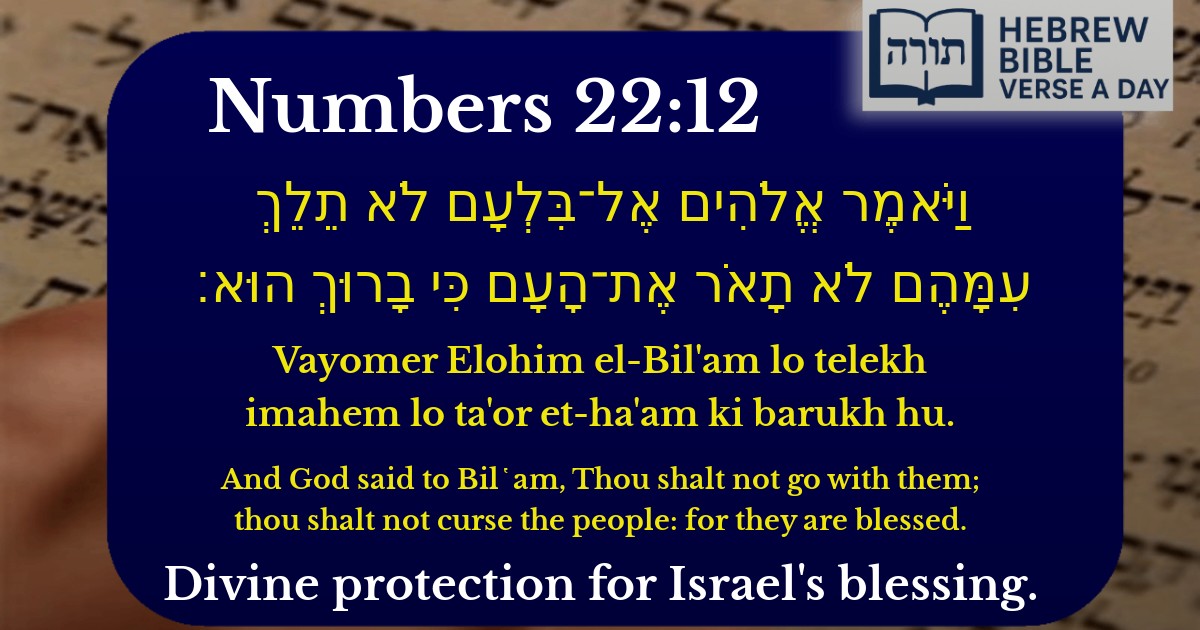Join Our Newsletter To Be Informed When New Videos Are Posted
Join the thousands of fellow Studends who rely on our videos to learn how to read the bible in Hebrew for free!
Hebrew Text
וַיֹּאמֶר אֱלֹהִים אֶל־בִּלְעָם לֹא תֵלֵךְ עִמָּהֶם לֹא תָאֹר אֶת־הָעָם כִּי בָרוּךְ הוּא׃
English Translation
And God said to Bil῾am, Thou shalt not go with them; thou shalt not curse the people: for they are blessed.
Transliteration
Vayomer Elohim el-Bil'am lo telekh imahem lo ta'or et-ha'am ki barukh hu.
Hebrew Leining Text
וַיֹּ֤אמֶר אֱלֹהִים֙ אֶל־בִּלְעָ֔ם לֹ֥א תֵלֵ֖ךְ עִמָּהֶ֑ם לֹ֤א תָאֹר֙ אֶת־הָעָ֔ם כִּ֥י בָר֖וּךְ הֽוּא׃
Parasha Commentary
📚 Talmud Citations
This verse is quoted in the Talmud.
📖 Sanhedrin 105b
The verse is discussed in the context of Balaam's (Bil'am) prophecy and his inability to curse the Israelites because they were blessed by God.
📖 Nedarim 31a
The verse is referenced in a discussion about vows and the power of blessings and curses, highlighting that Balaam could not curse the Israelites as they were blessed by God.


Divine Prohibition Against Cursing Israel
The verse (Numbers 22:12) records Hashem's command to Bil'am not to accompany Balak's messengers or curse Bnei Yisrael, stating "כִּי בָרוּךְ הוּא" - "for they are blessed." Rashi explains that this refers to the blessings given to the Patriarchs (Avraham, Yitzchak, and Yaakov), which cannot be revoked. The Talmud (Sanhedrin 105b) elaborates that Bil'am's power was limited - he could only curse when divine wrath was present, but since Israel was in a state of divine favor, his curses would be ineffective.
The Nature of Israel's Blessed Status
Rambam (Hilchot Teshuvah 3:3) derives from this verse that when Hashem decrees good upon Israel, no power can nullify it. The Midrash (Bamidbar Rabbah 20:12) compares Israel's blessing to a sealed document that cannot be altered. The phrase "בָרוּךְ הוּא" uses the singular ("he is blessed") to teach that Israel's blessing stems from their unity as one nation before Hashem (Sforno).
Bil'am's Restricted Prophecy
Rabbeinu Bachya notes that Bil'am received this prophecy at night, indicating his lower level of prophecy compared to Moshe. The Kli Yakar emphasizes that Hashem's command "לֹא תֵלֵךְ עִמָּהֶם" ("do not go with them") implies Bil'am should not even associate with those seeking Israel's harm, teaching the importance of distancing from negative influences.
Practical Lessons